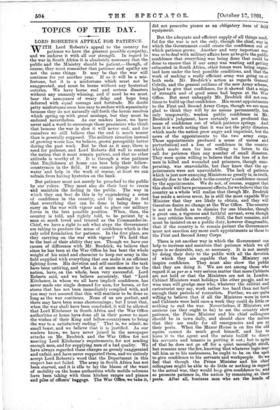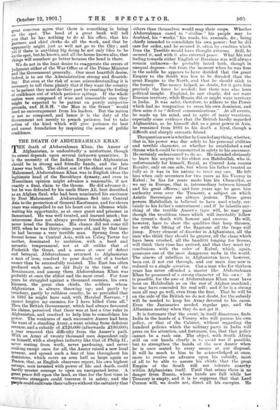TOPICS OF THE DAY.
LORD ROBERTS'S APPEAL FOR PATIENCE.
NVITH Lord Roberts's appeal to the country for patience we have the greatest possible sympathy, and we endorse it with all our strength. In regard to the war in South Africa it is absolutely necessary that the public and the Ministry should be patient,—though, of course, they must remember that patience and apathy are not the same things. It may be that the war will continue for yet another year. If so it will be a mis- fortune, but it is a misfortune which must not be exaggerated, and must be borne without any hysterical outcries. We have borne real and serious disasters without any unmanly whining, and if need be we must bear the annoyance of weary delay and hope long deferred with equal courage and fortitude. No doubt petty misfortunes seem less easy to endure with equanimity because they do not naturally call forth the heroic resolves which spring up with great mishaps, but they must be endured nevertheless. As our readers know, we have never said a word to encourage those pessimists who think that because the war is slow it will never end, and for ourselves we still believe that the end is much nearer than is generally supposed. The military situation instead of growing worse has, we believe, grown perceptibly better dUring the past week. But be that as it may, there is need for patience, and Lord Roberts did well to remind the nation that it must remain patient, and that no other attitude is worthy of it. It is through a wise patience that Englishmen at home can best help their fellow- 'countrymen in the field., If we cannot plunge into the water and help in the work of rescue, at least we can refrain from having hysterics on the bank.
But patience must not merely be preached to the public by, our rulers. They must also do their best to create and maintain the feeling in the public. The way in which they can best do this is by engendering a sense of confidence in the country, and by making it feel that everything that can be done is being done to carry on the war with vigour and to place our military forces in the best possible position. When, then, the country is told, and rightly told, to be patient by a man so much loved and trusted as the Commander-in- Chief, we have a right to ask what steps the Government are taking to produce the sense of confidence which is the only solid foundation for patience. In the first place, are they carrying on the war with vigour? We hold that to the best of their ability they are. Though we have our causes of difference with Mr. Brodrick, we believe that since he has been at the War Office he has bent the whole weight of his mind and character to keep our army in the field supplied with everything that can make it an efficient fighting force. His devotion and self-sacrifice in the task have been untiring, and what is of more moment- to the nation, have, on the whole, been very successful. Lord Roberts said, and we believe accurately, that "Lord Kitchener, in whom we all have implicit confidence, has never made one single demand for men, for horses, or for stores that has not been immediately complied with, and you may rest assured that this will continue to be done so long as the war continues. None of us are perfect, and there may have been some shortcomings ; but I trust that, when the war shall have been concluded, it will be allowed that Lord Kitchener in South Africa and the War Office authorities at home have done all in their power to meet the wishes of their King and fellow-countrymen to bring the war to a satisfactory ending." That is, we admit, no small boast, and we believe that it is justified. As our readers know, we have never joined in the newspaper attacks on Mr. . Brodrick and the War Office for not meeting Lord Kitchener's requirements, for not sending enough men, and for supplying men of a bad quality. We have always regarded these charges as grossly exaggerated and unfair, and have never supported them, and we entirely accept Lord Roberts's word that the Department in this respect has not failed. The army in South Africa has not been starved, and it is idle to lay the blame of the want of mobility on the home authorities while mobile columns have been taking with them kitchen ranges and pianos and piles of officers' baggage. The War Ofike, we take it, did not prescribe pianos as an obligatory item of • field equipment.
But the adequate and efficient supply of all things need. ful for the war is not the only, though the chief, way in which the Government could create the •confidence out of which patience grows. Another and very important way was so to deal with military affairs here as to give the public confidence that everything was being done that could be done to ensure that if our army was wasting and getting exhausted in South Africa, other forces were being organ. ised here under the best possible conditions, and that the work of making a really efficient army was going on at both ends. Mr. Brodrick's action as regards General Colvile, and the general outlines of the new Army scheme, helped to give that confidence, for it showed that a reign of strength and of good sense had begun at the War Office. But most unhappily Mr. Brodrick did not con. tinue to build up that confidence. His recent appointments to the First and Second Army Corps, though we are most glad to think they will by no means permanently, but only temporarily, weaken public confidence in Mr, Brodrick's judgment, have certainly not produced that sense of confidence out of which patience springs. And here it is worth noting that it was not the petty disasters which made the nation grow angry and impatient, but the news of the appointments to the two army corps. Those appointments produced a sense of unrest and perturbation, and a loss of confidence in the country which made men far less willing to listen to the call for patience than any number of small disasters. They were quite willing to believe that the loss of a few men in killed and wounded and prisoners, though exas- perating, was unavoidable, but they knew that the ap- pointments were not unavoidable. The lack of patience which is just now annoying Ministers so greatly is, in truth, directly due to the shock to the country's confidence caused by the appointments. We do not, of course, suggest that this shock will have permanent effects, for we believe that the country as a whole will realise that though Mr. Brodrick has made a serious error, he is still the most capable War Minister that they are likely to obtain, and they will therefore desire no change at the War Office. The country is not so foolish as to dismiss for one blunder,' though a great one, a vigorous and faithful servant, even though it may criticise him severely. Still, the fact remains, and must be insisted on as a public duty, however disagreeable, that if the country is to remain patient the Government must not sanction any more such appointments as those to the First and Second Army Corps.
There is yet another way in which the Government can help to increase and maintain that- patience which we all agree is so desirable, nay, so necessary. It is not merely by doing their duty to the public with all the devotion of which they are capable that the Ministry can inspire confidence. They must also show the public that they are doing it. We are not among those who regard it as per se a very serious matter that more Cabinets are not held or that the Ministers are not in London. Cabinet Ministers want holidays like other people, and no wise man will grudge men who, whatever the satirist and caricaturist may say, work rather too hard than not hard enough their periods of recreation. Further, we are quite willing to believe that if all the Ministers were in town and Cabinets were held. once a week they could do little or nothing to end the war. Nevertheless, if Ministers are anxious (as they ought to be) to see the country show patience, the Prime Minister and his chief colleagues should be in town daily, and should show the nation that they are ready for all emergencies and are at their posts. When the Manor House is on fire the old squire cannot do much good himself, and has to leave it to the agent and the estate bailiff to (Tired his servants and tenants in putting it out; but in spite of that he does not go off for a quiet' moonlight stroll, but remains near the fire, knowing that whatever logic may tell him as to his uselessness, he ought to be 6n the spot to give confidence to his servants and workpeople. So we feel that though the Prime Minister and his chief colleagues might be able to do little or nothing in regard to the actual war, they would help give confidence to, and so promote patience in, the nation by remaining. at their poste. After all, business men who are, the heads, of great concerns agree that there is something in being on the spot. The bead of a great bank will tell you that he has nothing to do at his office, that his partners and chief clerks do all the work, and that he apparently might just as well not go to the City ; and yet if there is anything big doing he not only likes to be on the spot, but he knows, and all the house knows also, that things will somehow go better because the head is there. We do not in the least desire to exaggerate the errors of judgment either of the War Office or of the Prime Minister and the Government generally. Our most heartfelt desire, indeed, is to see the Administration strong and flourish- ing. But even at the risk of some misunderstanding it is necessary to tell them plainly that if they want the country to be patient they must do their part by creating the feeling of confidence out of which patience springs. If the whole nation were composed of wise and reasonable men they might be expected to be patient on purely subjective grounds, and H.R.H. " the Man in the Street " would need no encouragement from his leaders. But the nation is not so composed, and hence it is the duty of the Government not merely to preach patience, but to take action of the kind which will give patience its best and surest foundation by inspiring the sense of public confidence.















































 Previous page
Previous page